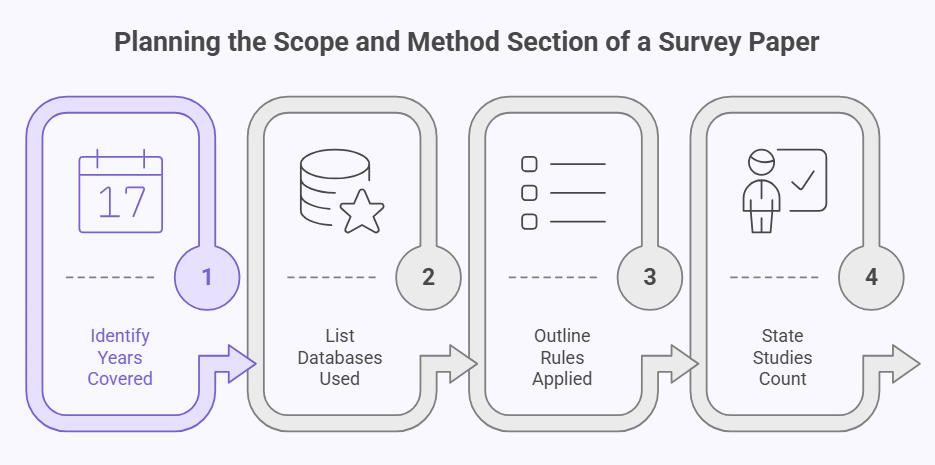Conferences bring people together to share new ideas, research, and progress. Many participants go to learn from different kinds of talks, from single research studies to bigger reviews. You might be wondering how do you present a survey paper in a conference.
Present a survey paper by giving a clear overview of past work. Focus on trends, gaps, and next steps in 10–12 minutes. Use 8–10 clean slides with simple language. Highlight key studies, show progress, and explain why the topic matters. Practice aloud to ensure smooth delivery and confident timing.
If you are curious about this topic, you will find everything explained in this article. It covers how to plan slides, manage time, use simple words, and connect with different kinds of audiences. Reading ahead will give you the full picture.
How Do You Present a Survey Paper in a Conference?
Presenting a survey paper at a conference is about giving a big overview. It is not just your work, but also what others have done. The aim is to explain the main ideas and trends in the field. Keep reading to know how to prepare and present it well.

Main Idea
Explain the focus of your survey clearly at the start of your talk. Share why the topic is important and what makes it worth discussing. Surveys show how different studies fit together and highlight what is missing. A clear beginning makes people pay attention right away.
Talk Length
Planning a short talk keeps the audience engaged and focused throughout. Ten to twelve minutes is the best length for this kind of presentation. Spending more time may cause listeners to lose interest quickly. Always keep your points sharp and avoid filling your talk with extra details.
Slide Count
Choosing 8 to 10 slides makes your presentation balanced and easy to follow. Too many slides will force you to rush, while fewer slides may leave gaps. Simple designs with fewer words and clear visuals work best. Always check your slides before presenting to avoid problems.
Easy Words
Speaking in simple and clear words helps everyone understand what you mean. Complicated terms and long phrases confuse people and break the flow. Replace heavy words with plain ones that express your ideas better. A clear style makes your talk more memorable and easier to follow.
Key Trends
Highlighting the big trends in your area makes your survey stronger. Show what areas are improving fast and where challenges remain. Many presenters do this in research events like international business and economics conferences to explain progress. Trends give audiences a picture of where the field is heading.
Next Steps
Closing your talk with next steps makes it more helpful for listeners. Share what needs deeper research and where gaps remain open. Offering practical advice or fresh questions gives people something to think about. This way, your talk feels complete and leaves value behind.
Slide Plan
Keeping a simple plan for your slides ensures a smooth flow in delivery. Begin with your topic, show background studies, highlight key results, and end with future steps. A clean order avoids confusion and helps your audience follow along. Clear slides support your words without overwhelming people.
Practice Time
Practicing more than once helps you stay confident during the event. Use a timer to keep your talk within 12 minutes maximum. Adjust your speed if it feels too fast or too slow. A well-rehearsed talk looks natural and keeps your audience focused.
A survey paper presentation should be short, clear, and well-prepared always. Simple slides with easy words make the talk smooth and effective. Showing main trends and next steps adds real value for listeners. With practice, you can present confidently and make your talk memorable.
Why Survey Papers Are Valued in Academic Conferences?
Survey papers are often given special attention in academic conferences. They not only collect knowledge but also present it in a way that saves time for the audience. To understand why they are valued, let’s break it down together.
Overview of Knowledge
Survey papers pull together research that has already been done in a field. Instead of going through many papers, readers get a clear overview in one place. This helps them understand where the field stands at a glance.
Saves Research Time
These papers save time for new and experienced researchers. Instead of spending weeks reading many separate works, they can learn the important findings quickly. This makes survey papers useful starting points for future research projects.
Highlights Gaps
One of the main reasons survey papers are valued is that they highlight gaps. They show what has been studied and what is missing. This guides future researchers to focus on areas that still need answers.
Builds Strong Context
Survey papers provide context for ongoing research. They help explain why certain studies matter and how they fit into the bigger picture. Many researchers look for guidance on publishing survey papers in conferences, as these papers provide a structured view of progress in a field and help set the stage for new research.
Encourages Collaboration
By gathering knowledge in one place, survey papers make it easier for researchers from different areas to connect. They may find common points of interest and start working together. This sharing of ideas can lead to new and better studies.
Survey papers are valued because they save time, show research gaps, and provide context. They also help researchers work together more easily. This is why they are seen as important in conferences and research communities.
How Do You Plan the Slide Deck for a Survey Paper in Conference?
Making a slide deck for a survey paper at a conference needs planning. The slides are not just for showing text; they guide the audience through your paper. A good plan makes the presentation clear and easy. Let’s see how to do this.
Slide 1: Title & Claim
Introduce your survey with a clear title that explains the main theme. Add a single-line claim that shows what the paper brings new. Include your name right after so the audience knows who is presenting. This slide sets the stage and makes the purpose clear quickly.
Slide 2: Why It Matters
Describe the central problem your survey is trying to address today. Show why the issue matters and how solving it can help the field. Make the need obvious so the audience feels the topic is relevant. This creates a strong interest before you move to detailed content later.
Slide 3: Scope & Method
Explain which years of studies you reviewed and which sources you used. Make clear what rules you followed for including or leaving out works. Add the number of studies so the audience knows the coverage is wide. This slide builds trust in your review and its fairness.
Slide 4: Field Map
Divide the research into three to five clear clusters or groups. Show how the studies fall into these clusters using a simple figure. Explain each cluster as a type or style of research work. The field map lets the audience see the structure at a glance.
Slide 5: Trend One
Show the first research trend using a clear and simple chart. Explain what the data means in one short and sharp sentence. The chart should be clean with only the needed lines or numbers. This makes the trend easy to understand and remember during the presentation.
Slide 6: Trend Two
Present the second trend using another simple chart with clear numbers. Add a one-sentence message that states what the trend shows well. Keep the design light so the slide is easy to follow quickly. A sharp visual paired with a clear note works best here.
Slide 7: Quality Check
Talk about strengths that appear in many of the surveyed studies. Also, explain the risks of bias that reduce the strength of the evidence. Keep the balance fair so the audience trusts your review work. This slide shows that you checked the quality and did not miss weaknesses.
Slide 8: What We Lack
Point out three things that the field is still missing today. Use short bullets so people can read the points very quickly. Keep each bullet sharp so the audience remembers the missing gaps later. This makes the case that more studies and work are needed.
Slide 9: Next Steps
Suggest three things that the field should do in the near future. Each step should be written in simple words that are easy to act on. Keep the list clear so the audience knows what matters most. This slide helps move from survey to action in practice.
Slide 10: Takeaway & QR
Close with one single message that sums up the full survey clearly. Add a QR code or link to your paper so people can read it. The message should be short but strong so it is remembered well. This ending leaves a final mark and shares your full work.
Clear slides make complex surveys simple for the audience to follow. Short sentences and clean charts always work better than crowded text. Every slide should serve one role and help build the full message. A simple ending keeps the talk sharp and easy to remember.
Here’s a Demo PDF you can check out
Who is the Audience for Your Survey Paper Talk at Conferences?
When you share your survey paper at a conference, your audience can be quite varied. Some will know the subject deeply, while others may just be starting out. The way you prepare your talk should match this mix of listeners. Let’s look closer at this.
Audience Mix
You will see a mix of experts, early-career researchers, and students in most conferences. Experts look for depth and advanced points. New researchers want clear guidance. Students need simple explanations. Keeping this balance makes your talk engaging for everyone.
Simple Core Idea
Start with the most important idea of your paper in a very simple way. This gives everyone a base to understand. Once you set this clear idea, you can slowly add deeper details for the experts. This way, no one feels left out.
Use Clear Language
Clear explanations of field-specific terms are essential the first time they appear. Never assume every listener understands them right away. A brief definition keeps newcomers engaged, while experts can still follow along without losing the flow of your presentation.
Balance Details
Try to balance your depth. Share background for those who are new, but also provide technical details for those who know more. When presenting at a conference, knowing your audience helps you decide how much background to include and how deep to go into technical details.
Connect with All
Look at your audience while talking. Notice if they look confused or interested. Adjust your speed and tone accordingly. Adding small examples or real-life comparisons also makes complex points easy to follow, which keeps everyone involved from start to finish.
The audience at a survey paper talk can vary widely. Keeping your idea simple, explaining terms, and adjusting depth helps you connect with everyone. This way, your talk becomes useful and enjoyable for all.
What Timing Should You Follow for a 10–12 Minute Talk?
Speaking in a conference with a strict time limit needs planning. You only have a short window to make your ideas clear. A simple plan keeps your talk smooth and easy to follow. Let’s see how to use your 10–12 minutes wisely.
Opening Claim
Begin by catching attention with the central question of your paper. Add one short claim that sets the stage for the audience. Keep your words simple so they are easy to remember. This first step should be quick, lasting less than one minute.
Scope Method
Move next to the limits and background of your study. Explain clearly what you covered and what you left out. Share the method you used so people understand your process. This part helps prepare the ground for the details that follow.
Field Trends
The middle section is where you present the most content. Show the wider view of your field with clarity and order. Highlight two important trends so the audience sees the big picture. This segment takes the most time and explains the heart of your work.
Missing Pieces
After showing the map and trends, point out what is absent. Gaps in research are important because they guide future work. Focus only on the most relevant limits so it remains clear. Keep this part simple and avoid adding unnecessary technical details.
Next Steps
End the main talk by suggesting what can be done ahead. New ideas for research give the audience something to think about. Share these points with short and clear sentences for easy recall. This keeps people engaged and prepares them for your closing.
Final Close
Finish with a summary that ties all your main ideas together. Restate the simple claim from the beginning so the message feels strong. Then invite questions with a friendly tone to show openness. This closing creates a smooth end and invites further discussion.
Planning your time helps you speak with clarity and control. Every part has its role and should be used with care. A simple outline makes your points clear without adding confusion. With this timing, your talk will be sharp and effective.
Here’s a sample script you can check out for ideas.
What Goes in the Scope and Method Part?
Planning the scope and method part of a survey paper is important. It tells the audience what time frame you studied and how you gathered your data. Without this, your paper may seem unclear. Let’s see what usually goes into this section.
Years Covered
Readers should first know the exact years your survey covers. By stating the start year and end year, they can understand the time frame of your review. This helps them judge whether the paper looks at recent changes or includes long-term developments.
Databases Used
It is also important to show which databases or sources were searched. This tells people how broad and reliable your search was. Mentioning these databases makes your work easier to trust because readers know you used credible and recognized sources.
Rules Applied
For better clarity, include simple rules that guided your study. Show in one or two bullets what was included and what was excluded. This allows others to see how you filtered the work and makes your method easier to follow and repeat.
Studies Count
After screening, the final number of studies should be stated. This figure shows the size of your review and tells readers how much evidence supports your findings. Without it, the scope might feel incomplete or leave questions about the depth of your study.
The scope and method explain clearly what your survey is based on. These details help others trust your process and your results. Without them, the work may look unclear or even incomplete. With them, your survey becomes stronger and more reliable.
What Visual Rules Should You Follow on Slides?
Designing slides is not just about adding words or images. It is about making the content clear and easy to follow. Good slides help the audience understand faster without getting lost. Let’s look at some rules you should follow.
- One Idea: Focus on one main point per slide, using big text and fewer words so the audience can follow without reading long sentences.
- Font Size: Always keep your body text large, at least 28 points or more, so that even people sitting far away can read clearly.
- Simple Charts: Avoid heavy tables filled with numbers, and instead use clean charts or grouped bullets that present data quickly and clearly.
- Clean Layout: Make sure charts have proper labels, clear axes, and visible units or dates, so viewers do not guess what information really means.
- Balanced Colors: Choose soft and consistent colors for slides, because bright or clashing designs may distract people and take attention away from your message.
- Limited Animations: Use simple slide transitions only when needed, since too many animations make the talk look flashy and harder to follow.
- Consistent Style: Keep the same font type, size, and layout throughout the deck so it looks professional and the audience stays focused on the content.
Slides are useful when they are simple, clear, and consistent. Adding too much text or design makes them confusing and weak. By following these visual rules, your slides will look sharper. Good slides make your talk stronger and easier to understand.
FAQs About How Do You Present a Survey Paper in a Conference?
Preparing a survey paper presentation often raises small but important doubts. These questions play a key role in delivering a smooth and confident talk. Having clear answers in advance helps prevent mistakes and builds assurance. Let’s explore some useful FAQs that address common concerns.
How Should I Start Confidently?
Beginning with confidence matters because it sets the tone for the talk. Take a deep breath, smile, and make eye contact with the audience. A short greeting or thank-you helps ease the atmosphere. This opening gives you control and makes listeners comfortable.
What Tone Should I Use?
The tone should always be friendly, clear, and steady throughout the talk. Avoid speaking too fast because it makes the audience confused. A calm and even tone helps your message sound stronger. This way, people listen carefully and understand better.
How Do I Handle Nervousness?
Feeling nervous is natural, but practice can help reduce it. Rehearse several times until you know your slides well. Focus on the message rather than on yourself to ease tension. Nervousness fades when you are more engaged with the audience.
Should I Use Hand Gestures?
Using hand gestures can make your talk more lively and natural. Keep them simple and avoid too much movement that may distract people. Gestures should match your words and emphasize key points. This small detail helps your audience stay engaged with you.
How Do I Engage the Audience?
Asking simple questions or using short examples can make people feel included. Look around the room and notice reactions to adjust your pace. Sometimes, a short pause keeps attention on you. Engaging the audience makes your talk more interactive and memorable.
How Do I Handle Questions?
At the end, listen carefully to each question without rushing to answer. If you don’t know, admit it politely and suggest where to look. Keep your answers short and clear so everyone understands. Respectful handling of questions makes you look confident and prepared.
What If Time Runs Out?
If you notice time is short, skip extra details and move to your main points. Focus on the summary slide so the audience still hears the key message. Practice with a timer to avoid running late. Keeping track of time shows respect for the schedule.
Should I Memorize My Talk?
Memorizing word-for-word often makes your speech sound stiff and unnatural. Instead, remember the key points and speak in your own words. Use your slides as reminders instead of a script. This way, your talk feels natural and easy to follow.
How Do I End Strongly?
A strong ending repeats your main idea in a clear way. Add one closing line that is short but powerful. Thank the audience and invite questions warmly. This makes your talk feel complete and leaves a lasting impression.
What Mistakes Should I Avoid?
Avoid reading directly from slides because it looks unprepared and boring. Do not overload slides with too much text or small fonts. Skipping practice is another big mistake that weakens delivery. By avoiding these errors, your presentation becomes much more effective.
Conclusion
Presenting a survey paper at a conference is not just about standing on a stage and reading slides. It is about showing the whole field in a way that everyone can understand. A good presentation highlights past work, shares progress, and makes the talk clear and useful for the audience.
The answer to how do you present a survey paper in a conference is simple: give a short and focused talk, use 8 to 10 clear slides, speak in easy words, highlight key trends, and finish with future steps. This keeps your talk engaging and informative from start to end.
Before you finish preparing, remember a few final tips: keep your timing strict, rehearse more than once, and avoid filling slides with text. Use clear examples, speak with confidence, and smile when presenting. Best wishes for your next presentation ahead.








